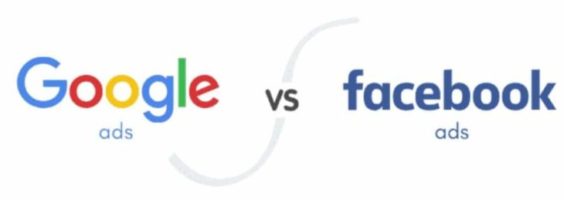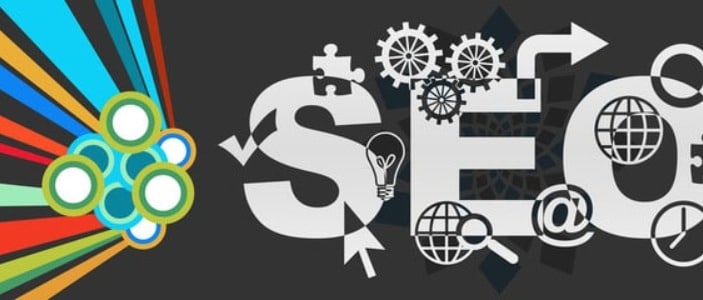
Image Optimisation For SEO, Tips You Need to Know
08/02/2022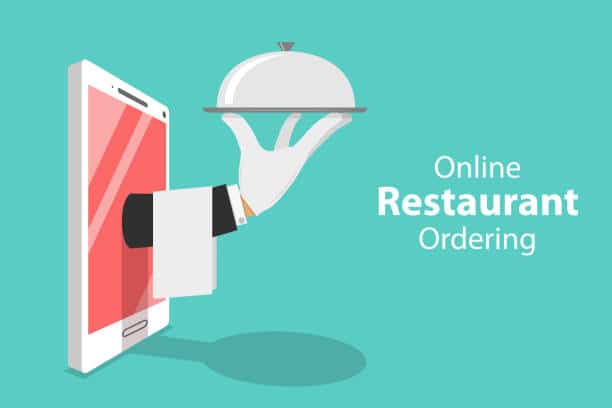
Restaurant Mobile apps – A complete guide for 2022
07/03/2022Are you an entrepreneur looking to take your business’ marketing efforts up a notch but aren’t sure which advertising platform is best for reaching customers. Then Mobilise Solutions is the place for you.
We get asked frequently: Should I do SEO or ads? What about social media campaigns – is this one better than another?” We’re here for all those tedious details so that you can get the most out of it!
These conversations are not only enlightening but also refreshing. The different marketing channels bring out the best in people as they argue their point with passion and clarity, exploring every potential pro or con for what would work most effectively given your budget.
It’s important to note the difference between Facebook advertising and Google AdWords. The two platforms have different features that can impact your overall marketing strategy, such as targeting customers based on their interests or reaching potential clients with specific campaigns. However, a common denominator in all these discussions is how Facebook vs google differently impacts conversions – one of many keystones needed for successful advertisement!
When you don’t understand your marketing efforts, it can result in significant budget waste and ultimately cause frustration for the business owner. This often leads them to stop all their other activities, such as advertising or public relations campaigns, which would lead to less exposure for your brand. Our company Mobilise Solutions work closely with Google and Facebook; we know what it takes to succeed with an advertisement on both platforms.
So let’s talk Facebook Ads vs. Google Ads!
Google Ads for Marketing.

Google is a force to be reckoned with on the internet. The company’s ad platform (formerly known as Google Adwords; now called “Google Ads”) generates 90% of their revenue, making it an essential part of generating income for this popular search engine that most people use every day!
Google is a search engine that has been specifically designed to facilitate online shopping. The reason why advertisers enjoy using this platform so much? It’s because of purchase intent-people want what they see on the screen right away (or at least soon).
The fundamental difference between Google Ads and Facebook Ads is purchase intent.
You are catching the prospect when they are in a time of need and deeper within your marketing funnel. This means that you will make more significant connections with them than if we were just Facebook spamming people’s feeds without any intention or interest in a purchase.
Google Ads are keyword based.
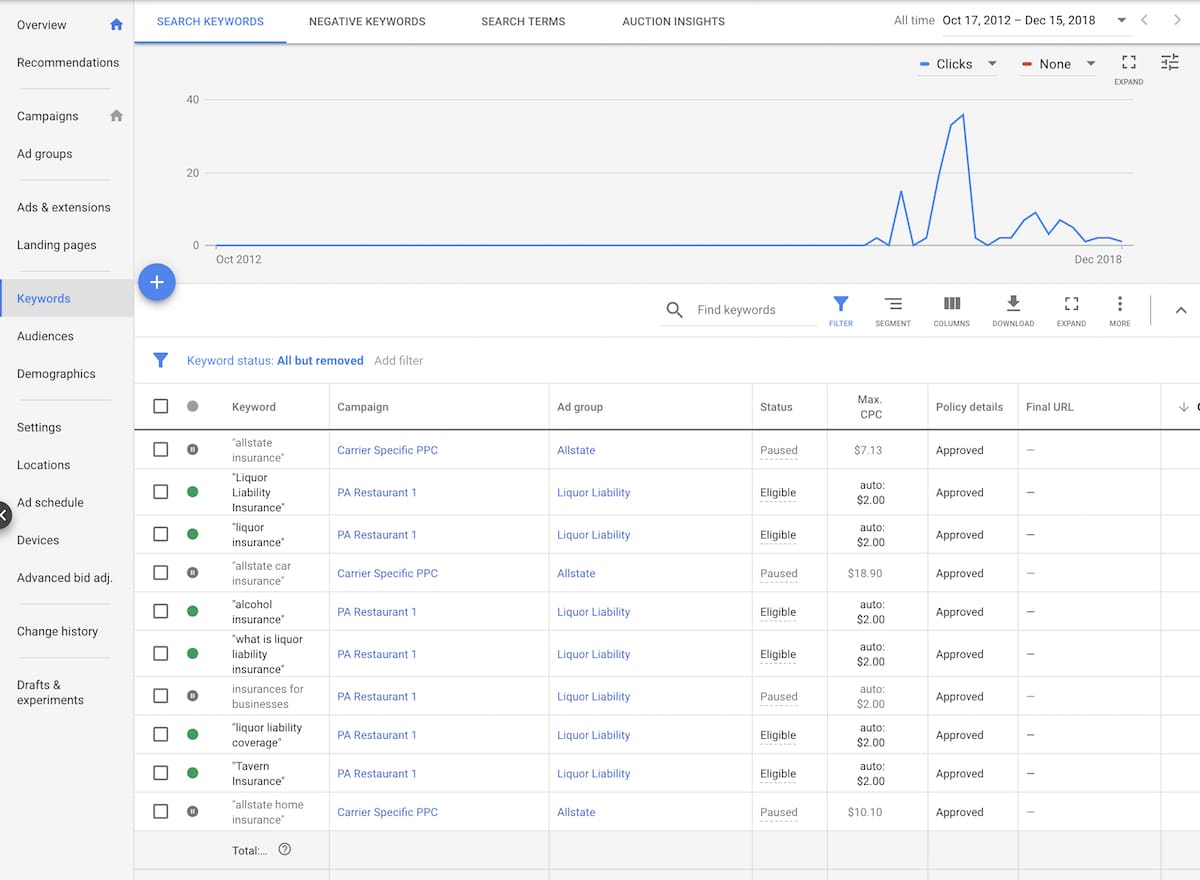
Keywords are the key to success when advertising with Google Ads. In Google search results, you choose the keywords you want your ad to appear for. Facebook uses different targeting and demographic parameters, similar to building your advertising audience.
Choosing the keywords is critical; our advice is to use “exact match“, or you will easily waste your budget.
What is “exact match?
“Exact match” keywords allow you to reach prospects searching only for the specific keyword that is being bid on or close variants. With this type of bidding system, it’s easy to control your advertising budget and get a better return on investment.” Exact match” is only available to advertisers using Google Ads and Bing Ads.
Google is constantly changing their algorithm, so it’s not just your bid/budget that matters. Several factors determine whose ad will show higher on the search results page. Including ad copy, extensions, or landing pages you’re pushing traffic back to; all these things combined give a better chance of showing up at the top.
Google explains Exact Match as:
With Exact Match, you can show your ad to customers searching for your exact keyword or exclusively close variants of your precise keyword. Of the four keyword matching options, Exact Match gives you the most control over who sees your ad and can result in a higher clickthrough rate (CTR). With Exact Match, your ads may appear when the meaning of someone’s search exactly matches your keyword. As a result, you might not receive as many impressions or clicks when using Exact Match, but you’ll probably see a higher clickthrough rate (CTR). That’s because your ads can appear to people searching for terms that are almost precisely related to your product or service.
Google Ads Match Types got three different match types, let me introduce you to the two others:
1. Broad match- Broad match is the most versatile targeting option and reaches a very broad audience. When using this setting, your ad will show up whenever someone’s search query includes any word in our desired keyword phrase regardless of whether it’s at the beginning or end! So, for example, if you choose “luxury car” as one key term, those searching for fast cars would be eligible to see them too because synonyms can sometimes trigger off-site freshness.
2. Phrase match- The flexibility of phrase match advertising is similar to broad match, but you’ll have more control. Your ad will only appear when a user queries your key phrase using the keywords in order just as they are inputted; however, there might be other words either before or after.
Google uses all of this data to formulate a Quality Score and shows the ad with the highest-ranking first.
This Quality Score plays a massive role in helping Google determine whose ad is displayed highest in the search results.
When it comes to your ad copy and keywords, think about the common sense things people will type into Google when looking for a better price.
This brings up another key point — search volume.
Why search volume matters with Google Ads.
We know that the success of your Google Ad depends on search volume. That is, how often and in what ways people are searching for what you sell-which means it’s crucial to stay top-notch with SEO too!
Google Ads are a great way to get your business in front of potential customers, but make sure you do plenty of research first. For example, ask an agency what keywords they think will produce the most leads for this type of campaign, and look at search volume data on those terms before launching anything!
If there are fewer than, say, 500 queries per month for your target keyword, you’re not going to get a lot of leads, no matter how much money you’re willing to spend.
That being said, when there is low search volume for your product or line of business, it doesn’t mean you should scrap the idea altogether. Maybe the product or line of company you’re selling has a super high commission. When that’s the case, you may only need a handful of leads per year to break even and profit from your campaigns.
When you’re targeting larger, mid-market commercial lines business that yields commissions in excess of $5-10k, it’s still worth running ads even if the search volume is lower.
If you’re doing keyword research yourself, several tools are available that will help determine search volume. SEMRush and Rankmath tend to be among the best in this regard, but they do not come free of charge; if your advertiser intentions go beyond just running ads periodically, then it’s worth paying a subscription fee with either one of them.
I use Rankmath for keyword research and many other digital marketing tasks. For a long time, SEMRush was better at keyword research, but in my opinion, Rankmath is a better overall tool and just as good as SEMRush with keyword data.
A free “do it yourselves tool” option is Google keyword planner, but it will not be very accurate. So I never use it or will recommend it to others.
Google Adwords Express vs. Google Ads
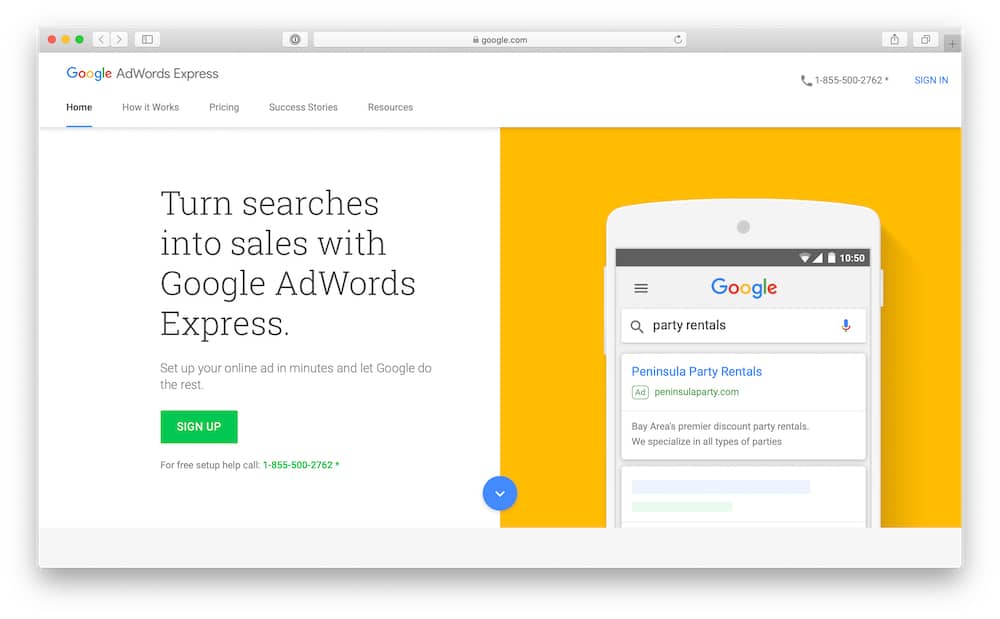
It’s confusing enough when running ads, but Google has two different ad platforms. First, Adwords Express, and then there’s Google Ads!
Google Adwords Express is something I wouldn’t recommend for anyone. It’s a “new beginners” version of Google Ads that attempt to build your ads for you. Unfortunately, it doesn’t work very well, and the default settings help Google, not you.
This is where working with an experienced ads agency comes into play. They know the tricks to make sure your campaign hits its stride so that budget is most efficiently used!
Facebook Ads

The first thing you need to know about Facebook is that it’s an advertising platform hidden as a social media network. Everything in there has been designed to get advertisers and their products right into your feed, so they can reach out straightaway to capture our attention!
If you want to market your products/services on Facebook, the only way to happen is with ads. And I’m not talking about “boosting” an occasional post here and there; It means running regular advertisement campaigns for weeks at a time in order make sure they show up high enough within people’s feeds.
You can’t get Facebook without paying. It’s like the air you breathe – there are no shortcuts!
This is in large part why people think Facebook doesn’t work. This makes sense because you’re posting boring or low-quality posts in addition to high-quality ones, so when someone does engage with what they post – which isn’t often!
It also means that any engagement such as likes/shares won’t help much since those engagements don’t increase visibility for anyone but ourselves (and sometimes our friends).
If you want organic reach on Facebook, post to your timeline.
With that being said, Facebook advertising can be a great way to promote your business. Not only does it have a lower cost-per-click(CPC) than Google and better conversion rates, but the social media platform is also historically more engaging, which means there’s an increased chance of people seeing what you offer!
The cost per click is lower because there is less (or zero) purchase intent. Facebook advertising can be compared to traditional direct mail campaigns where you spray and pray for your target audience’s attention, rather than targeting specific people who have already shown interest in what they offer through online research beforehand.
You engage a target audience by marketing to those in your specific demographic.
And now to the fun part! The number of options you have for targeting your audience on Facebook is staggering. You can build an accurate profile by studying the data that has been collected from users, which means there are plenty more ways to get exactly who YOU want!
The reason why Facebook is so powerful is fourfold, in my opinion.
1. Facebook is the most popular social media platform in Australia, with 14 million monthly active users! People are there all day long, checking it six times per day. That means you have an opportunity to get their attention and maybe even sell them something or just let your brand shine through- if the advertising is done correctly, of course.
2. The way an advertisement is experienced can differ depending on the person.
A Google ad is a text-only ad, and you’re limited as to how much text you can write in the ad. You also can’t use videos or images in your ads, at least not yet.
You can use Facebook to create a more engaging and persuasive message that will ultimately lead you closer to your goal.
The platform offers many features for marketers, such as images or videos with compelling content paired perfectly alongside exciting headlines.
Facebook allows you to be more convincing, persuasive, and “win over” the prospect, and that’s a significant advantage over Google Ads.
With that in mind, it’s not enough to be good. If you want to succeed on Facebook, many things need almost perfect execution- which means you can’t take shortcuts and make mistakes!
One of the keys to success with Facebook Ads is being creative and a game of copywriting. Unfortunately, the platform’s search engine intent doesn’t exist, so you have to make your messaging extremely convincing for people to click on it!
Turning a cold prospect into an actual buyer is not easy. First, you need to make sure your offer, creativity, and budget come together for the campaign to be successful- this usually requires testing many different variations on what you’re doing before committing time or money!
The more creative you are with your advertisement, the better. That’s why you need someone who knows how to make an emotional connection with customers for them not only to see what they want but buy it too! All the pieces have to fit the puzzle to succeed with the champagne.
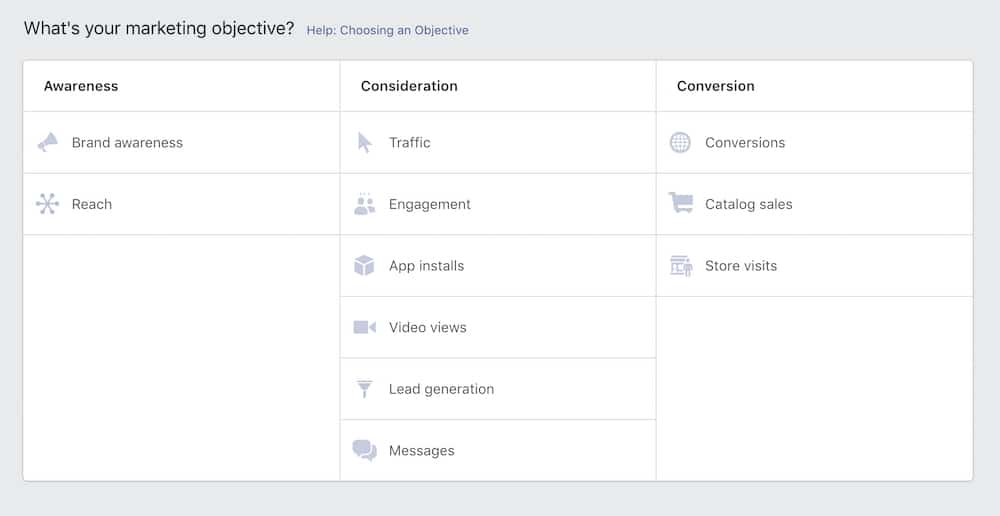
3. Facebook has so many different advertising options, what they call “objectives”, that it can be hard to choose which ones are best. For example, you could run a campaign for traffic, conversions or video views depending on your goal with the post!
Facebook has a lot of ways to run ads, and because it owns Instagram, you can do so from both platforms from one interface.
4. Let’s say you are an agency of some kind. Then maybe the most important is you can qualify and disqualify prospects through your copy and offer.
With SEO and Google Ads, you can’t control how many people search for what your company sells. You also can’t dictate the quality of leads either; they may be high-quality or low quality!
On Facebook, you have a little more control because you can disqualify people with your ads.
For example, if you are an agency that offers insurance of some kind. The headline could be: “Have you been claims free for five straight years? Call us today for a discounted claims-free rate on your insurance!”
Your call to action tells people who are not claim-free not to call with a headline like this.
By doing this, You can improve your profitability by manipulating the quality of leads.
What Facebook doesn’t tell you.
The great thing about Facebook advertising is that it allows for many different campaigns. The downside? You need to make sure you run the right objectives inappropriate orders, or else your campaign will most likely fail!
Many people who try Facebook Ads fail ever to return. This is because they don’t know that there’s a specific order in which you need your ads running for them to be able to use the social media marketing pixel effectively!
When running Facebook Lead Ads, you should first aim them for the Traffic Objective and optimise your landing page accordingly for Landing page views.
With this strategy, you’ll be driving people back to a landing page and just like with Google Ads. The more optimise for traffic objective is telling Facebook’s algorithm what kind of user typically clicks on your ads then goes onto the site – that’s all they need!
Once you’ve collected enough data from your Facebook pixel, and the ad frequency is at 3, meaning people have seen it about three times in their feed since running this campaign – then convert that impression into an actual conversion.
The conversion objective is to optimise for users who have historically clicked on an ad and gone through completing a lead form.
(You need to have conversion tracking set up for this, so it’s all appropriately tracked.)
You know that feeling when you think something will happen soon, but it doesn’t? That’s how conversion goals work. You need patience and time for Facebook data collection before making any conclusions about your campaign audience – which can take a few weeks, if not months!
This is where impatient people fail, not getting results soon enough and stopping the campaign before it’s fully optimised.
The Facebook pixel is the key to successful advertising on social media. This small code allows you to track data and see who’s engaging with your page or ad, which in turn helps make informed decisions about where best to spend money next time around!
Make sure you create your pixel and install it before you do any Facebook advertisement.
Don’t be this guy on Facebook.
When we talk to clients who have failed at Facebook advertising, they all fit into the same description:
- they are extremely impatient
- they don’t know what they’re doing in Ads Manager
- they’re afraid to spend/lose money
- they aren’t creative
If this is you, then Facebook advertising is not for you or let a professional help you with your advertisement and make it a success.
While advertising might not be for you, the solution is simple. Your challenge in this competitive market with word-of-mouth referrals and no one knowing who you are besides your network – can be a slow death if done incorrectly or not at all!
You have to be willing and ready for financial loss, but the good news is that if you know what’s happening on Facebook, your odds of winning are much higher.
The owner’s mindset matters when running any successful company, especially if they’re new at it or have ‘t been doing well lately. The right attitude will help ensure success by setting realistic expectations (which we know is key!), staying positive no matter what happens today/yesterday ́_ _
Conclusion — which one should I do, Facebook or Google?
While both Google and Facebook want you to be successful, they’re also willing to accept new advertisers who may not know what is best for their business. They both want you to come back for more, so they let you figure things out.
I say do both because they serve the consumers at different points in their purchasing journey.
It’s not one or the other. It depends on your business, market, or what you are selling. Just have in mind Facebook is a younger age group. It means it’s not for everyone.
Time is money, don’t wait for people to come to you. Yes, it can be challenging with running ads, but if done right, it can be very profitable. Sometimes you need to spend the money to make money!!


